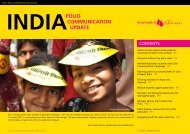Independent Monitoring Board - Global Polio Eradication Initiative
Independent Monitoring Board - Global Polio Eradication Initiative
Independent Monitoring Board - Global Polio Eradication Initiative
- No tags were found...
You also want an ePaper? Increase the reach of your titles
YUMPU automatically turns print PDFs into web optimized ePapers that Google loves.
AT A GLANCELed by an enthusiastic District Commissioner and supported by a strongProgramme team, it seems that UC-4 and Gaddap may be turning the corner.Recent environmental surveillance samples have tested negative for the polio virus.Recent community engagement drives are impressive. If the Programme can nowalso strengthen its migrant population strategy, it can capitalise on this new positivedirection.The Programme in UC4 isperforming well – it should aimfor perfectionPishin, Quetta BlockPishin District is one of the three most problematic areas in the polio-afflictedQuetta Block (the others being Quetta City and Killah Abdullah). The populationis 99% Pushto. In the most recent March 2012 immunisation campaign, 16% ofchildren were missed.We were presented with a long list of reasons why children are being missed.There are pockets of refusals. Teams are often poorly constituted (too many childvaccinators, not enough females or government workers). Limited movementof GPEI partner staff because of security concerns means a lack of supportand supervision. And though the Programme has worked hard to remove theparamedics who were undermining its progress, many of the medical officers whohave replaced them are so far disinterested.Medical officers in Pishin mustraise their gameA long list of challenges is in some respects reassuring. The Programme hasidentified well the reasons why children are being missed. The analysis has helpedformulate sound corrective actions. <strong>Polio</strong> control rooms have been establishedand poor performing staff have been suspended. <strong>Polio</strong> campaigns have beenstaggered to spread supervision, and outsourcing has been implemented. The clearassignment of responsibilities to each partner is to be commended.The Programme has performeda strong analysis of theproblems and instigated soundactionsThe IMB was concerned to hear the Programme state that ‘certain things seemunmanageable with the current stance’. If this is true, the stance must be changed– and changed quickly. Further analysis and action will be needed but now is notime for defeatism. A solid foundation exists on which the Programme can build.Khyber Agency, FATAKhyber Agency is home to the only type 3 polio virus circulation in Asia. Since 2010,it has recorded 64 cases of polio – an astonishingly high figure.Insecurity has been a problem in Khyber, but the Programme has actedopportunistically to vaccinate displaced children in refugee camps: en masse, upto the age of 15, and with a Short-Interval Additional Dose strategy. Some of thosevaccinated had not received polio drops since September 2009. The impressivedetermination to vaccinate these vulnerable children must be sustained.If a programme is to besuccessful, nothing should beregarded as ‘unmanageable’Khyber Agency – home to theonly WPV3 in AsiaIn the face of insecurity thedetermination to reach childrenis impressiveThe Programme has been innovative in using local children as an adjunct to itssocial mobilisation teams, enabling the teams to reach into compounds that wouldotherwise be off-limits to them.Rapid intelligence on the fluidsecurity situation is imperative38<strong>Independent</strong> <strong>Monitoring</strong> <strong>Board</strong> of the <strong>Global</strong> <strong>Polio</strong> <strong>Eradication</strong> <strong>Initiative</strong> Every Missed Child




